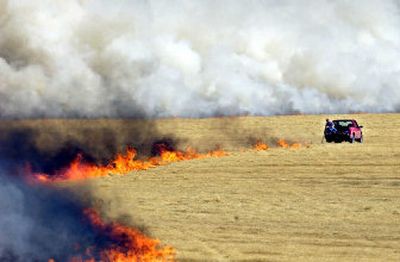Field-burn advocates have good day

The Idaho Supreme Court on Wednesday upheld a lower court ruling that agreed with the state’s determination “there are no economically viable alternatives to field burning.”
Groups that had challenged the controversial agricultural practice argued that the state Department of Agriculture used a “one-sided analysis” to make that determination in 2004 without a “meaningful opportunity” for public input.
The department responded that the groups’ lawsuit was moot because it was filed after the 2004 field burning season ended.
The Supreme Court decided the case was not moot but disagreed with the plaintiffs’ appeal alleging the agency’s determination was “arbitrary, capricious or an abuse of discretion.”
“The director adequately addressed the factors required by Idaho Code,” Justice Daniel T. Eismann said in the ruling, supported unanimously by the remaining justices.
Attorney Brad Purdy, representing the American Lung Association, Safe Air For Everyone and the Idaho Conservation League, said his clients were disappointed by the ruling.
“The judiciary is a bit hamstrung under law that allows discretion to state agency heads,” Purdy said.
“Some have characterized our current political administration this way … above the law. That’s what we have at the Department of Agriculture.”
Purdy said the court had construed the law in a way “that effectively grants the Department of Agriculture sort of unfettered, unreviewable control over actions by bluegrass growers that literally, in cases, have resulted in people’s deaths.”
Linda Clovis, a spokeswoman with the North Idaho Farmers Association, said she couldn’t be happier with the court’s ruling.
University of Idaho researchers and farmers have said all along there isn’t an economically viable alternative to torching the fields, Clovis said.
“It’s hard to see in print, in the paper, other groups saying there is a viable alternative,” she said.